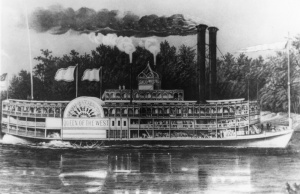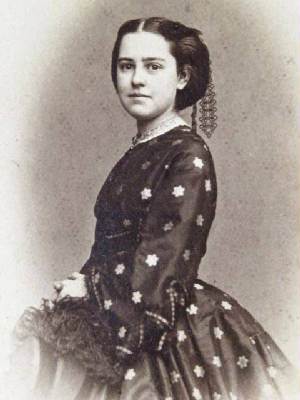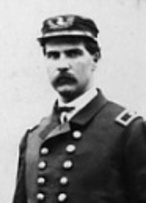 Vicksburg River Romance, on the banks of the Mississippi, during the Civil War, is a tale of greed, convenience and much more than just a Plantation Widow’s Dowry. General Grant and his Army depended heavily on the brown water navy of Admiral Porter, not only for bombardment of the fortifications around Vicksburg, but for rapid transportation and supply. One Naval Captain, not only provided artillery support, but gained an unexpected trophy of war, that exceeded his wildest dreams.
Vicksburg River Romance, on the banks of the Mississippi, during the Civil War, is a tale of greed, convenience and much more than just a Plantation Widow’s Dowry. General Grant and his Army depended heavily on the brown water navy of Admiral Porter, not only for bombardment of the fortifications around Vicksburg, but for rapid transportation and supply. One Naval Captain, not only provided artillery support, but gained an unexpected trophy of war, that exceeded his wildest dreams.
During the War, Alfred Burnett, a resident of Cincinnati, was not only an enlisted soldier, of sorts, in the Union Army, but also was an official war correspondent for the newspapers, Press, Times, and Commercial, of that bustling riverside city in Ohio. Burnett filed many letters, human interest stories and employed a verbal humor to the stress, heartbreak and nightmare of the daily conflict. One of the topics, was love and romance, that wove its way into daily affairs and the following Vicksburg tale, would have been controversial in 1863, but the story line might even raise eyebrows currently. Burnett filed the following story with the papers in Ohio,
“During the late movement against Vicksburg the national transports were fired upon by a rebel battery at Skipwith Landing, not many miles from the mouth of the Yazoo. No sooner was the outrage reported at head-quarters than the Admiral sent an expedition to remove the battery and destroy the place. The work of destruction was effectually done; not a structure which could shelter a rebel head was left standing in the region for several miles around.
 Among other habitations destroyed was that of a Mrs. Harris, a widow lady, young, comely, and possessed of external attractions in the shape of a hundred and fifty “negroes,” which she had contrived to save from the present operation of “the decree,” by sending them up the Yazoo River. But Mrs. Harris was a rebel—intense, red-hot in her advocacy of Southern rights and her denunciation of Northern wrongs. Although she had not taken up arms against the Government, she was none the less subject to the indiscriminating swoop of the Proclamation; her slaves, according to that document, were free, and if the Confederacy failed, she could only get pay for them by establishing her loyalty in a court of justice. Her loyalty to the Yankee nation?—not she! She was spunky as a widow of thirty can be. She would see Old Abe, and every other Yankee, in the happy land of Canaan before she would acknowledge allegiance to the Washington Government. Nevertheless, being all she possessed of this world’s valuables, she would like to save those slaves.
Among other habitations destroyed was that of a Mrs. Harris, a widow lady, young, comely, and possessed of external attractions in the shape of a hundred and fifty “negroes,” which she had contrived to save from the present operation of “the decree,” by sending them up the Yazoo River. But Mrs. Harris was a rebel—intense, red-hot in her advocacy of Southern rights and her denunciation of Northern wrongs. Although she had not taken up arms against the Government, she was none the less subject to the indiscriminating swoop of the Proclamation; her slaves, according to that document, were free, and if the Confederacy failed, she could only get pay for them by establishing her loyalty in a court of justice. Her loyalty to the Yankee nation?—not she! She was spunky as a widow of thirty can be. She would see Old Abe, and every other Yankee, in the happy land of Canaan before she would acknowledge allegiance to the Washington Government. Nevertheless, being all she possessed of this world’s valuables, she would like to save those slaves.
 “Nothing easier,” suggested Captain Edward W. Sutherland, of the United States steam-ram Queen of the West, who, attracted by her snapping black eyes, engaged in a friendly conversation with the lady after burning her house down. “Nothing easier in the world, madam.”
“Nothing easier,” suggested Captain Edward W. Sutherland, of the United States steam-ram Queen of the West, who, attracted by her snapping black eyes, engaged in a friendly conversation with the lady after burning her house down. “Nothing easier in the world, madam.”
“How so, Captain? You don’t imagine I will take that odious oath, do you? I assure you I would not do it for every slave in the South.”
“But you need not take that oath, madam—at least not the oath.”
“I do not understand you, Captain,” said the widow, thoughtfully.
“I said you need not take the oath of allegiance; you can establish your loyalty without it—at least,” with a respectful bow, “I can establish it for you.”
“Indeed! How would you do it, Captain?”
“Simply enough. I am in the Government service; I command one of the boats of the Western navy—technically denominated a ram, madam—down here in the river. Of course, my loyalty is unimpeached, and, madam, I assure you it is unimpeachable. Now, if I could only say to the Government, those slaves are mine”——
The Captain waited a moment, to see what effect his speech was producing.
“Well!” said the widow, impatiently tapping with her well-shaped foot one of the smoking timbers of her late domicile.
“In short, my dear madam, you can save the slaves, save your conscientious scruples, and save me from a future life of misery, by becoming my wife!”
The Captain looked about wildly, as if he expected a sudden attack from guerrillas. The widow tapped the smoldering timber more violently for a few minutes, and then, turning her bright eyes full upon the Captain, said:
“I’ll do it!”
The next arrival at Cairo from Vicksburg brought the intelligence that Captain Sutherland, of the ram Queen of the West, was married, a few days since, on board the gunboat Tylor, to Mrs. Harris, of Skipwith Landing. Several officers of the army and navy were present to witness the ceremony, which was performed by a Methodist clergyman, and Admiral Porter gave away the blushing bride. She is represented to be a woman of indomitable pluck, and, for the present, shares the life of her husband, on the ram Queen of the West.”
War creates strange bedfellows and whether this tale of a Vicksburg River Romance and the Plantation Widow’s Dowry, is true or not is irrelevant. The fact remains, the brown water Captain not only gained a Southern bride, but earned a reputation as an unsurpassed negotiator extraordinaire.
Bummer

